Despite commitments made by three levels of government, Metro Vancouver’s painful, drawn-out transit funding deadlock isn’t over.
This morning Peter Fassbender, the minister responsible for TransLink, announced the province would spend $246 million over three years for transit improvements in Metro Vancouver.
Fassbender maintained the funding was an increase of $130 million over the one-third funding the province had previously committed, because the money announced today was for bus, Seabus and Skytrain expansions. Fassbender said the province had previously only committed to pay for one-third of the cost of major capital projects: light rail systems for Surrey and along Vancouver’s Broadway Corridor.
But Metro Vancouver mayors say that commitment still comes up short because the province has only agreed to fund the first three years of a comprehensive 10-year, $7.5 billion plan drafted by the mayors in 2015.
“The phase one funding will put into play some of the elements of the plan,” said Linda Hepner, mayor of Surrey. “What it doesn’t put into play is the elements of preparation for the advancement of those other dollars.
As the three levels of government continue to wrangle, commuters are increasingly struggling with reduced service, increased congestion and full buses and trains.
The province had previously said it would fund one-third of the mayors’ plan if municipal and federal levels of governments came up with matching levels of funding. The federal Liberal government, which made infrastructure spending a key part of their election platform, allocated $350 million to Metro Vancouver transit projects and made a commitment to increase the federal funding share for transit projects to 50%.
That leaves the municipalities to raise 17% of the cost of the plan.
The mayors say they are still waiting for a formal response from the province six weeks after sending the B.C. government a proposal for raising their share of the funds. The proposal includes:
· a 2% fare increase in 2018;
· selling $100 million worth of TransLink properties;
· a new regional development levy that would go directly to transit;
· a property tax increase;
· a comprehensive road and bridge tolling system to be put in place starting in 2021;
· land in kind from Vancouver and Surrey to offset the costs of the new rail systems.
The mayors say the proposal will raise $5 billion, which breaks down to 17% of the capital costs for the 10-year plan and all of the operating costs.
In return, the mayors have requested $3 billion over 10 years from the province, a share of the provincial carbon tax, support for road and bridge tolling and returning governance of TransLink to the mayors.
A transit funding plebiscite in 2015 failed when Metro Vancouver voters rejected Metro Vancouver mayors’ proposal to introduce a 0.5% regional sales tax to fund the municipal contribution to the transit plan.
The province has previously rejected the mayors’ request to use part of B.C.’s carbon tax to fund transit. While Transportation Minister Todd Stone returned oversight of strategic planning to the mayors in 2015, the mayors continue to lobby to be put back in charge of the transportation agency.
TransLink's Mayors' Council had been limited to an advisory role between 2007 and 2015, when former transporation minister Kevin Falcon restructured TransLink's governance and gave decision-making powers to an appointed board.
@jenstden




